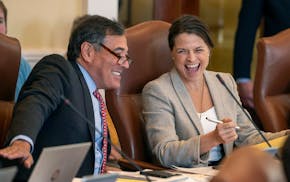Pledging support for low-income workers, Minneapolis Mayor Betsy Hodges called Thursday for fairer scheduling, proper overtime pay and wider access to paid sick days in her second State of the City address.
Hodges also called for the expansion of private-sector unions but stopped short of advocating for a citywide minimum wage, to the dismay of some activists in the standing room-only crowd at the American Swedish Institute. She said improving the treatment of workers — specifically those paid the least — is central to achieving broader goals of eliminating gaps between white and minority residents.
"We don't just need to build the workforce of the future, we need to build the workplace of the future," Hodges said. "The expectation that if you worked hard you could get ahead is now more myth than reality for low-income people and many people of color."
The comments won praise from some City Council members and DFL state legislators, but other groups offered criticism and caution.
Leaders of 15 Now, an organization pushing for a citywide minimum wage increase — the first in Minnesota — said they were "disappointed" the mayor instead promoted a regional wage hike. The Minnesota Restaurant Association issued a statement urging the mayor to listen to its members before implementing workplace mandates and to "keep in mind that Minneapolis restaurants do not operate in a vacuum."
Council Member Cam Gordon said the mayor's plans would likely require additions to the city's ordinances and the development of new ways to enforce the rules. But he said the changes could have a considerable effect. "There's definitely some meat there," he said.
The mayor's speech was a sprawling and lengthy oration, clocking in about 7,400 words, more than 900 words longer than President Obama's last State of the Union address.
Hodges followed through on a promise she made in last year's State of the City speech: to begin dismantling some of the regulations that business owners have said create barriers for people trying to start new enterprises in the city.
The mayor announced that she and City Attorney Susan Segal have completed a report on the city's business rules and recommended several changes, including making licensing applications shorter, developing guides for city design standards and providing customer service training to some city staff.
In comments about the work, Hodges used a theme repeated throughout the speech: ensuring that the ideas and talents of all Minneapolis residents are allowed to flourish. "Sometimes getting our genius to the table means getting out of our own way," she said.
Other highlights included a discussion of the city's efforts on climate change, including a growing slate of programs such as citywide compost collection and a partnership with local utility companies. Hodges said she'll be offering monthly goals on sustainability, beginning with a charge to increase recycling in the city.
The mayor said Minneapolis' interest in progressive goals such as sustainability and equity is building the city's reputation and landing it on the list for several nationwide initiatives. Those include My Brother's Keeper, a White House program aimed at minority boys and young men — a group Hodges said deserves more support and attention.
While encouraged by the so-called Working Families Agenda, activists with Neighborhoods Organizing for Change plan to descend on City Hall on Friday with their own demands — including cutting corporate subsidies and nixing city ordinances for low-level crimes.
The mayor said the city and employers should do more by offering job training and work options, particularly for 18- to 24-year-old men, who are most at risk of getting involved in crime or being victims of violence. She said that work will benefit another goal: improving the lives of babies and very young children.
"When done right, this work creates a virtuous cycle: The babies in need of care and support are being parented by fathers who, with support of their own, will be able to provide it," she said.
Hodges also highlighted the discrimination that still follows transgender people. "In our interactions with transgender people — frankly, as in our interactions with anyone — we must start with love and with celebration," Hodges said.
While the mayor made short mentions of the city's historically low crime rates and improving 911 response times, few of her pronouncements related to the primary work of the city, such as public works, public safety and neighborhood development. Those activities gobble up most of the city's $1.2 billion annual budget.
Council President Barb Johnson said she was pleased with the mayor's goals for workers and on erasing racial inequities. But for now, she said, many people in her north Minneapolis ward still feel there's been more talk than action.
"There's a lot of people saying they're doing the work," she said. "But I want to support the kind of work that really works."
erin.golden@startribune.com • 612-673-4790
eric.roper@startribune.com • 612-673-1732
Biden administration moves to make conservation an equal to industry on US lands

Sweeping gun legislation approved by Maine lawmakers following Lewiston mass shooting
The Latest | A second seated juror dismissed by judge from Trump's hush money trial

